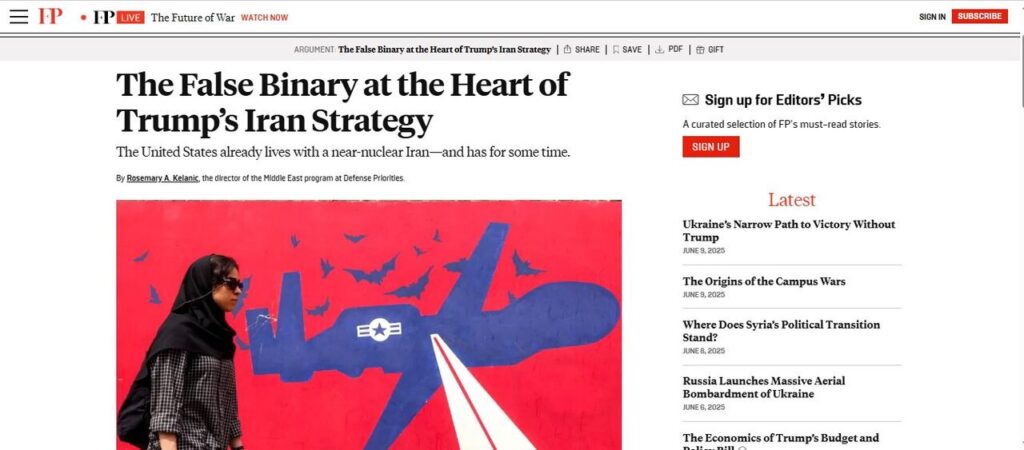Tehran – In a recent article on foreign policy, Rosemary A. Keranic argues that the best path for the US regarding Iran’s nuclear program is to maintain the current status quo, and that Iran’s nuclear incubation period is a long-standing reality.
The article’s appeal for rationality in the US administration is commendable. However, Kelanic overlooks several important contextual factors.
The political landscape surrounding Iran’s nuclear program in the United States remains unstable, shaped by deep divisions within the Republican Party, calling for military intervention from hardliners. Furthermore, Israel’s aggressive stance, Tehran’s expected retaliation, and Democrats’ opposition to the current administration’s foreign policy have been standardized and underrated in the analysis.
Tel Aviv: The Greatest Obstacle to Peace in West Asia
Israel has established itself as a solid opponent of Iran’s peaceful nuclear program, claiming that agreements close to the dismantling of the “Libyan style” are unacceptable. Israeli military authorities are openly preparing for a preemptive attack on Iranian nuclear sites, and are conducting air force training to simulate attacks on Iranian underground facilities such as Natanz and Fordaw.
However, full-scale strikes could require US logistics assistance, particularly to coordinate refueling and missile defense. Beyond direct military action, Israel has a history of secret operations against Iran’s nuclear program. From cyberattacks (such as the Stuxnet virus) to assassination of nuclear scientists, Israeli intelligence news projects have sought to slow Iran’s progress. Tel Aviv has a history of deliberate attempts to derail the ongoing negotiations between Iran and the United States, and the estimates of US articles that have full control over Israeli actions are inaccurate.
Tehran has revealed that Israel’s attacks on nuclear facilities will cause immediate and unbalanced responses. Possible actions for Tehran are:
Military Counter Strike: Iran launches missile barrages targeting Israeli military bases, critical infrastructure and US assets in the region.
Mobilization of the Axis of Resistance: Iranian allies in the region, like Hezbollah and Ansalara, were able to launch multifaceted conflicts with Israel and engage in coordinated strikes.
Accelerating nuclear development: Israel’s strikes urge Iran to abandon its control, and could begin to enrich over 60% of uranium, potentially crossing the nuclear weapons threshold.
The risk of a full-scale war remains high, warning that Iran will defend sovereignty “in the last drop of blood.” Israel’s first strike will fundamentally change the strategic balance of West Asia. Persian Gulf countries like Saudi Arabia and the UAE are worried that direct conflict could ripple over, affecting oil markets and trigger retaliation attacks across the region.
US Democrats aren’t on par with Trump
Many Democrats have advocated a new diplomatic approach and emphasized the revival of the Joint Comprehensive Action Plan (JCPOA) as the most effective tool to address Iran’s nuclear program. They argue that Trump’s 2018 withdrawal not only undermined diplomatic progress, but also alienated major US allies, particularly European countries, from their investment in the success of the agreement. Democrats further argue that Trump’s volatile foreign policy has made negotiations with Iran even more difficult. His administration vibrated between military threats and ambiguous diplomatic overtures, creating uncertainty for both Tehran and its US allies.
To counter Trump’s policies, Democrats were able to try to limit funding for aggressive measures against Iran. Historically, lawmakers have introduced bills aimed at strengthening parliamentary oversight of diplomacy and limiting presidential authorities on military action. Democrat leaders can also use official statements and media campaigns to challenge Trump’s Iranian strategy and frag them as unstable and counterproductive. They were able to work with their European allies to counter unilateral action.
Additionally, Congressional Committees were able to investigate Trump’s Iranian policies and scrutinize its effectiveness and broader results. The potential hearing may focus on sanctions, military plans and Trump’s diplomatic failure.
Trump’s Republican split
Beyond the Democratic stance, key Republican factions continue to advocate for military intervention as a viable solution to Iran’s nuclear program. Some analysts, including Keranic, have suggested that Trump’s influence over his party is dominant, but this claim appears to be exaggerated. Many Republican lawmakers argue that Trump’s biggest pressure policy (focusing on tough economic sanctions) is more effective than diplomatic negotiations in curbing Iran’s nuclear progress.
Rather than pursuing diplomatic concessions, a considerable number of Republicans support sustained economic restrictions to put pressure on Tehran. Several figures within the party go further, explicitly supporting military action as a necessary measure. This position coincides with the demands that broader Republicans seek a return to maximum pressure, with some lawmakers even considering a preemptive strike at Iran’s nuclear site if economic measures prove inadequate.
The differences between Republican hardliners who advocate military intervention and Democrats who promote diplomatic engagement underscore the fundamental uncertainty surrounding US policy towards Tehran. Meanwhile, Israel’s aggressive stance and Iran’s steadfast warnings against retaliation have raised interests and turned miscalculation into a potential flashpoint for local conflict.
Keranic’s appeal to maintain the status quo overlooks the evolving complexity of the situation. Without a cohesive and realistic strategy, Washington perpetuates the cycle of escalation, with widespread results on local security and global stability.

